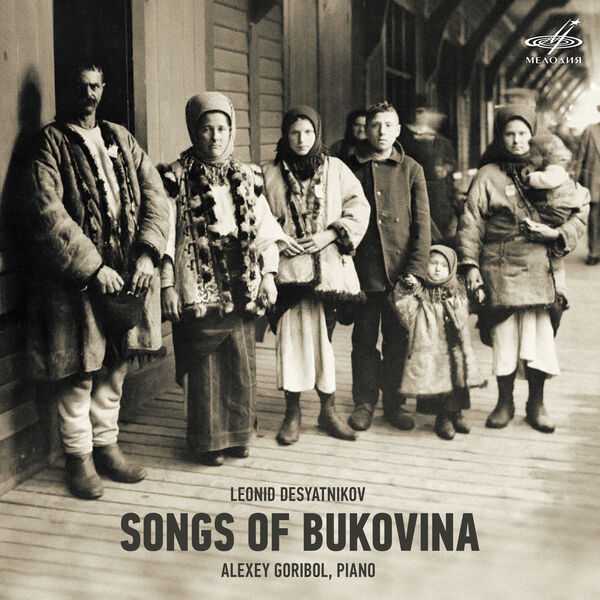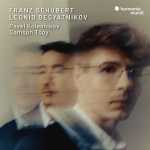
Composer: Leonid Desyatnikov
Performer: Alexey Goribol
Format: FLAC (tracks)
Label: Melodiya
Catalogue: MEL CD 1002607
Release: 2019
Size: 753 MB
Recovery: +3%
Scan: cover
01. Steppe Wind A-Blowin’
02. The Bridesmaid Started Crying
03. Ian, Where d’you Come From? – Beyond the Danube
04. Oh, Petrivochka, a Night so Short
05. The Wind Is Blowing, the Sun Is Warm
06. A Rocky Mountain
07. Oh, I’ll Go to the Garden
08. Oh, My Sweet Vast Canada
09. Oh, the Clock Chimed Midnight
10. A Swallow Has Flown In
11. Oh, a Cuckoo Cuckooed in the House on the Corner
12. If Only Mother Had Known
13. Green Willow, Green Willow
14. Poplars Grew from One Field to Another
15. I Sew Six Seeds of Maize
16. Red Arrowwood Has Blossomed White
17. Oh, Whose Wedding Is This?
18. Red Arrowwood, Green Leaves
19. A Pike in the Sea
20. They Say I’ve Lost My Looks
21. Oh, Dear Sheep of Mine
22. A Lady Had a Husband, She Loved Some Peter Though
23. Oh, You, Wretched Singer, What Are You Looking For?
24. A Pipe Made of Maplewood
Melodiya presents a world premiere, the recording of Leonid Desyatnikov’s Songs of Bukovina performed by Alexey Goribol, a dedicatee of the cycle. The liner notes were written by Maria Stepanova, the author of In Memory of Memory.
Leonid Desyatnikov is one of the most ‘textual’ composers of our time. However, in his latest chamber opus, Songs of Bukovina, he chooses the format of … ‘24 Preludes for Piano’! This is how the cycle is subtitled. The tradition originated by Bach, adapted by romanticism into the microcosm of ‘cycle of miniatures’, and elevated to the rank of ‘intimate diary of the artist’ by hyper-individualists like Chopin, Scriabin, et al. is crossbred by Desyatnikov with Transcarpathian folklore. The music of the Bukovinian “prelude songs” combines the intonation spice of West Ukrainian flavours with devices from the arsenal of today’s composing techniques.
“In one interview, Desyatnikov speaks about the alien fundamental principle of his works, the external impulse he follows and departs from, very briefly: ‘I call it a MacGuffin.’ Having read this, I went googling. Wikipedia explains that a MacGuffin is a cinematic term for an object or event that is necessary for the development of the plot and characters, but completely unimportant in itself. A pirate treasure chest that everybody hunts for and nobody gets hold of, or Chekhov’s gun that hangs on the wall through all three acts and never fires will probably be the closest analogues.
“A MacGuffin may be in plain sight, it may flash and disappear at the very beginning, but the story is impossible without it. The most interesting thing here is the combination of utmost importance and absolute insignificance of the initial impulse, that very point of reference: as if the existing world could be built from anything at all, in four notes, like on the television show.”
– Maria Stepanova, Songs of Bukovina: Twelve Attempts to Start Speaking
This music was performed for the first time in October 2017 in American Ballet Theatre’s production choreographed by Alexei Ratmansky. The ballet included half of the twenty-four preludes. The premiere of the entire cycle performed by Alexey Goribol took place in Perm in June 2018. The Songs of Bukovina were premiered in Moscow on 1 October. It was after the Moscow premiere when it was agreed that the Songs of Bukovina would be recorded by Firma Melodiya. Leonid Desyatnikov was present at the recording sessions, and the final result received a high appraisal from him.
The creative work of Leonid Desyatnikov, one of the most sought-after Russian composers of today, is difficult to make fit any existing framework. He cannot be labeled as a dissident avant-gardist, or as a Soviet conformist, or as a neo-folklorist. In the age when a composer’s main problem lies in the antinomy of ‘original’ and ‘borrowed’, the author of The Children of Rosenthal, an opera about cloned classical composers, makes ‘unoriginal’ into the main creative principle (“The more it changes, the more it stays the same”). The composer simply eliminates the opposition of ‘one’s vs. someone else’s.’ However, this is far from being identical to Stravinsky’s neoclassicism with its almost Salierian attitude to composition (“I cut up music like a corpse”); on the contrary, Desyatnikov sincerely believes in the selected quotations and allusions, which gives the listeners salutary sound and semantic ‘beacon lights’ in the murky streams of the modern academic discordance.
Recorded at the Grand Hall of the Moscow Conservatory in March 2019



